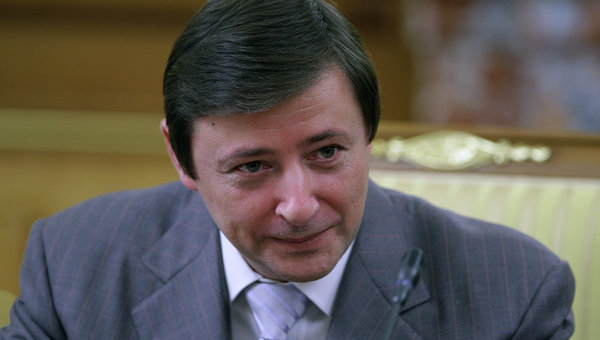
Georgian Policy Toward the North Caucasus Causes Concern Among Russian Experts
Publication: Eurasia Daily Monitor Volume: 9 Issue: 81
By:

North Caucasus federal district officials anticipate sweeping structural changes by the end of May after Vladimir Putin is inaugurated as the President of Russia. The incoming President’s administration is expected to increase its focus on the North Caucasus. Nezavisimaya Gazeta reported on April 23 that the North Caucasus federal district was bound to be merged back into the Southern district and its headquarters moved from Pyatigorsk to the city of Rostov-on-Don. The southern federal district is currently made up of Adyghea, Kalmykia, Krasnodar, Rostov, Astrakhan and Volgograd regions. The North Caucasus federal district is made up of Dagestan, Chechnya, Ingushetia, North Ossetia, Kabardino-Balkaria, Karachay-Cherkessia and Stavropol region. The new Southern federal district is projected to add Adyghea, Krasnodar and Rostovregion to the present North Caucasus federal district, while assigning Kalmykia, Astrakhan and Volgograd to the Volga federal district. Experts say that the reform deliberately is designed to avoid concentration of non-Russians in the North Caucasus federal district and providing the opportunities for seamless integration of preparatory work for the Winter Olympics in Sochi in 2014 with pacification of the North Caucasus (https://www.ng.ru/politics/2012-04-23/1_link.html, April 23).
The reshuffle would mean another attempt to solve the North Caucasus’ problems with administrative means and failure of the Medvedev’s preceding move to create a separate district for the North Caucasus. The North Caucasus federal district was created by a presidential decree only in 2010, separating it from the predominantly ethnic Russian-populated Southern federal district. The merger would also mean that Moscow is less concerned about the implementation of the Sochi Olympics’ project in 2014, than about the long-term goals in the region. It is also plausible that the new administrative reshuffle will be a transitional move before another major change, such as the long rumored abolishment of ethnicity-based republics in the North Caucasus.
On April 25-26 Russian experts on the North Caucasus discussed the future of the region at a conference in Vladikavkaz, North Ossetia. The title of the conference, “The Strategy of Russia in the Caucasus in the 21st Century,” was symptomatic of the prevalent Russian view of the North Caucasus as an essentially foreign playground for the Russian state’s experiments, rather than a place where locals have their own legitimate interests and plans for the future. Georgia’s more proactive approach to the North Caucasus received extensive attention at the conference. The director of the center for regional studies and forecasting at Southern Federal University in Rostov-on-Don, Vladimir Chernous, said that after the creation of the North Caucasus federal district, the Georgians “try to form an all-Caucasian identity as opposed to the Russian identity.” Chernous proposed that Moscow should redouble its efforts to affirm an all-Russian identity in the North Caucasus, but also suggested that this was impossible without an influx of ethnic Russians into the region (https://www.kavkaz-uzel.ru/articles/205633/, April 26).
The deputy head of the Caucasus studies department at the Russian Institute for Strategic Studies, Sergei Mikhailov, lashed out at Georgia for recognizing the Circassian “genocide” on May 20, 2011. According to Mikhailov, the Circassian nationalists “blackmail” Russia, using the Sochi Olympics to gain concessions, such as genocide recognition by Moscow and the repatriation of expelled Circassians. Georgia might move further ahead and recognize treatment of Vainakhs (aka Chechens and Ingush) by Russia as another “genocide,” Mikhailov alleged. Russian journalist and expert Yana Amelina voiced worries that after Georgia lifted the visa requirement for Russian citizens “Georgia’s influence in the North Caucasus will inarguably increase and that is a worrying symptom.” Amelina expressed her bewilderment at the inaction of the North Caucasus federal district in the face of the assumed “Georgian threat” (https://north-osetia.kavkaz-uzel.ru/articles/205682/, April 27).
Georgia’s influence in the North Caucasus is indeed bound to increase and has already gained major inroads into the region by its proactive policy. However, this is a natural outcome of the complex situation in the region. First, Georgia’s extended border with all North Caucasus republics predisposes this country to have some kind of relations with its immediate neighborhood. Second, the North Caucasus’ isolation artificially imposed on the region by Moscow makes it inherently responsive to any foreign influences, so Russian officials should only blame themselves for upholding an unsustainable policy of isolation for so long. Third, undemocratic political systems, such as the ones currently functioning in the North Caucasus are by definition highly sensitive to any inflows of new information, ideas and people. Again, this is hardly Georgia’s fault. Finally, Georgia does not promote insurgency or other types of revolt in the North Caucasus. Instead it has adopted and utilized the concept of projecting soft power by providing a venue for cultural exchanges and peaceful declaration of existing grievances. Therefore, Georgia’s activism in the North Caucasus actually contributes to the search to find a peaceful settlement to the spiraling cycle of violence engulfing the North Caucasus that Russian policies have been unable to reverse.
Feeling its clout in highly asymmetrical and admittedly rocky relations with Russia, Georgia announced an official foundation of the government’s policy toward the North Caucasus. Georgian lawmakers are now discussing a special law that would outline this policy (https://vz.ru/news/2012/4/29/576742.html, April 29).
Two experts at the conference in Vladikavkaz, Sergei Peredery and Eduard Popov, attributed the widely expected administrative changes concerning the North Caucasus to the growing discontent of ethnic Russians with Moscow’s policies in the region. In Peredery’s view, Moscow decided to add other predominantly ethnic Russian regions to the North Caucasus to prevent the only ethnic Russian region of Stavropol currently included into the North Caucasus federal district from moving forward to declare the status of a Russian republic. According to Popov, there is growing public demand for the creation of Cossack republics and the possible recreation of Cossack defensive lines in southern Russia that once existed in the region in the 19th century (https://north-osetia.kavkaz-uzel.ru/articles/205655/, April 27).
This is a relatively new phenomenon whereby ethnic Russians in southern Russia are becoming increasingly frustrated with the central government’s inaction, and revert to discussions about seeking their own ways of separating themselves from the North Caucasus. Russian separatism is by itself a completely new set of challenges for Moscow that will likely push the Kremlin to make even more dramatic changes in the North Caucasus in the near future.




